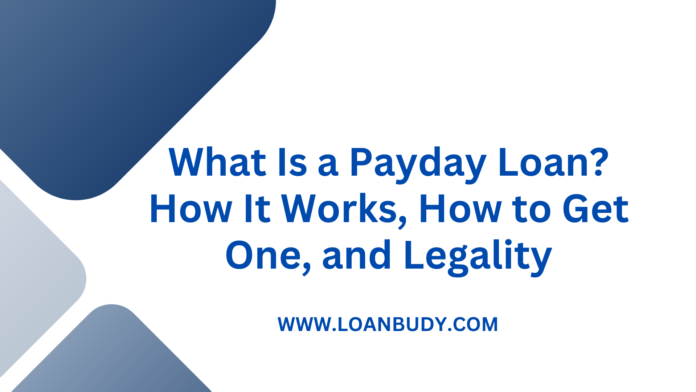Payday loans are short-term, high-interest loans based on your income. The principal of the loan is generally equal to a part of your upcoming paycheck.1
Payday loans take advantage of the borrower’s need for immediate credit by charging a higher-than-normal interest rate. Before taking out a payday loan, learn your options, such as emergency loans.
Key Takeaways
- Payday loans are short-term, very-high-interest loans available to consumers.
- Payday loans are typically based on how much you earn, and you usually have to provide a pay stub when applying for one.
- Payday loans are not available in all states. Sixteen states and the District of Columbia outlaw payday loans of any kind.
- A number of laws have been put in place over the years to regulate the high fees and interest rates of payday loans.
Understanding a Payday Loan
Payday loans function as unsecured credit as they do not require any collateral. They are often considered a form of predatory lending due to their extremely high interest rates, hidden fees, and the lack of concern on the lender’s part regarding whether the borrower can pay back the loan or not.2
Because of these high costs, payday loans often end up being a debt trap for many consumers who find it impossible to claw back out of the burden of debt they’ve accumulated from these loans. Before taking out a payday loan, consider other options, such as traditional personal loan alternatives.
How Payday Loans Work
Payday loan providers will normally require you to show proof of your income—usually your pay stubs from your employer. They will then lend you a portion of the money that you will be paid. You will have to pay the loan back within a short time, generally 30 days or less.1
Payday lenders take on a lot of risk because they don’t check your ability to pay back the loan. Because of this, they normally charge very high interest rates for payday loans, and they may also charge high fees if you miss your repayments. This can be dangerous for borrowers because it can mean that you’ll need to borrow more money to cover the cost of the first loan.
How to Get a Payday Loan
You can apply for payday loans online at various loan providers. You can also apply for payday loans at local providers who are generally small lenders with physical stores.
For a payday loan application, you will need a bank account and government ID. You will also need to provide proof of income, which can be done through your work pay stubs. The principal of a payday loan is typically a percentage of your income.
Additionally, your wages may function as collateral where the lender can automatically receive a portion of your wages in order for the loan to be paid back.
Payday Loan Interest Rates
Payday lenders charge very high levels of interest: as much as 780% in annual percentage rate (APR), with an average loan running at nearly 400%. Most states have usury laws that limit interest charges to anywhere from 5% to 30%. However, payday lenders fall under exemptions that allow for their high interest.34
As these loans qualify for many state lending loopholes, borrowers should be wary. Regulations on these loans are governed by the individual states, with 16 states—Arizona, Arkansas, Colorado, Connecticut, Georgia, Maryland, Massachusetts, Montana, New Hampshire, New Jersey, New York, North Carolina, Pennsylvania, South Dakota, Vermont, and West Virginia—and the District of Columbia outlawing payday loans of any kind.3
In California, for example, a payday lender can only lend up to $300 at a time. They can also charge a fee of up to 15% of the loan amount, with a maximum fee total of $45. Although 15% doesn’t seem exceptionally high, on a 14-day loan, it becomes the equivalent of an APR of 460% for a $300 loan.52
Although the federal Truth in Lending Act requires payday lenders to disclose their finance charges, many people overlook the costs. Most loans are for 30 days or less and help borrowers to meet short-term liabilities. The loans usually can be rolled over for additional finance charges, and many borrowers—as high as 80% of them—end up as repeat customers.617
A number of court cases have been filed against payday lenders as lending laws have been enacted since the 2008 financial crisis to create a more transparent and fair lending market for consumers. If you’re considering taking out a payday loan, then a personal loan calculator can be a vital tool for determining what kind of interest rate you can afford.
Are Payday Loans Legal?
Efforts to regulate payday lenders were proposed in 2016 under the Obama administration and put in place in 2017, when the Consumer Financial Protection Bureau (CFPB), under then-Director Richard Cordray, passed rules to protect consumers from what Cordray referred to as “debt traps.”8
The rules included a mandatory underwriting provision requiring lenders to assess a borrower’s ability to repay a loan and still meet everyday living expenses before the loan is made. The rules also required lenders to provide written notice before trying to collect from a borrower’s bank account and further required that after two unsuccessful attempts to debit an account, the lender could not try again without the permission of the borrower.8
These rules were first proposed in 2016, and under the Biden administration, the new leadership at the CFPB established stricter rules for payday lending, which became mandatory on June 13, 2022.98
In Feb. 2019, the CFPB—then under the Trump Administration and Director Kathleen L. Kraninger—issued proposed rules to revoke the mandatory underwriting provision and delay implementation of the 2017 rules.10
In June 2019, the CFPB issued a final rule delaying the Aug. 2019 compliance date, and on July 7, 2020, it issued a final rule revoking the mandatory underwriting provision but leaving in place the limitation of repeated attempts by payday lenders to collect from a borrower’s bank account.
Cryptocurrency Investment Understanding the Pros and Cons
Frequently Asked Questions (FAQs)
Are Payday Loans Fixed or Variable?
Payday loans are usually meant to be paid off in one lump-sum payment when you get your paycheck. Because of this, the interest rate on these loans is fixed. In fact, many payday lenders don’t even express their charges as an interest rate, but they instead charge a fixed flat fee that can be anywhere from $10 to $30 per $100 borrowed.2
Is a Payday Loan Secured or Unsecured?
Most payday loans are unsecured. This means that you do not have to give the lender any collateral or borrow against a valuable item as you do in a pawn shop.
Instead, the lender will normally ask you for permission to electronically take money from your bank, credit union, or prepaid card account. Alternatively, the lender may ask you to write a check for the repayment amount, which the lender will cash when the loan is due. Under federal law, lenders cannot condition a payday loan on obtaining authorization from the consumer for “preauthorized” (recurring) electronic fund transfers.14
How Long Do Payday Loans Stay in the System?
The records of traditional loans may be kept for six to 10 years by credit bureaus—the companies that calculate credit scores—which in turn may affect your ability to borrow money in the future. Payday lenders do not usually report to the credit bureaus, even in case of overdue repayments; however, the payday loan may be filed once it is passed to the collectors after the lender sells the debts.15
If you repay your payday loan on time, then your credit score shouldn’t be affected. On the other hand, if you default on your loan and your debt is placed in the hands of a collection agency, then you will see a dip in your score.
Can Payday Loan Debt Be Forgiven?
In practice, it’s very rare for payday loan debt to be written off. This is because payday lenders make significant sums from the interest that they charge on these loans.
This means that you should try and pay off payday loans as soon as you possibly can. If you can’t pay back a payday loan, the account may be sent to a collection agency, which will pursue you for the money and interest that you owe. This is not only unpleasant but also can add money to your overall debt—and it will damage your credit.
Can You Get a Payday Loan Without a Bank Account?
Yes. Having a bank account isn’t universally required to borrow money, but lenders that don’t require it generally charge high interest rates. This includes many payday lenders. Payday lenders may ask for a bank account, but sometimes a prepaid card account may be enough to qualify.
Because these loans cost so much and may be difficult to repay, it’s almost always best to avoid them. If you can’t pay back the loan promptly, fees can add up, leading to a debt trap that’s hard to get out of. Because of this, you should only take out a payday loan if you are absolutely sure that you can pay it back.
The Bottom Line
Payday loans are designed to cover short-term expenses, and they can be taken out without collateral or even a bank account. The catch is that these loans charge very high fees and interest rates.
Borrowers should be wary of these loans. They may be considered predatory lending, as they have extremely high interest, don’t consider a borrower’s ability to repay, and have hidden provisions that charge borrowers added fees. As a result, they can create a debt trap for consumers. If you’re considering a payday loan, then you may want to first take a look at alternative emergency loans for bad credit.












